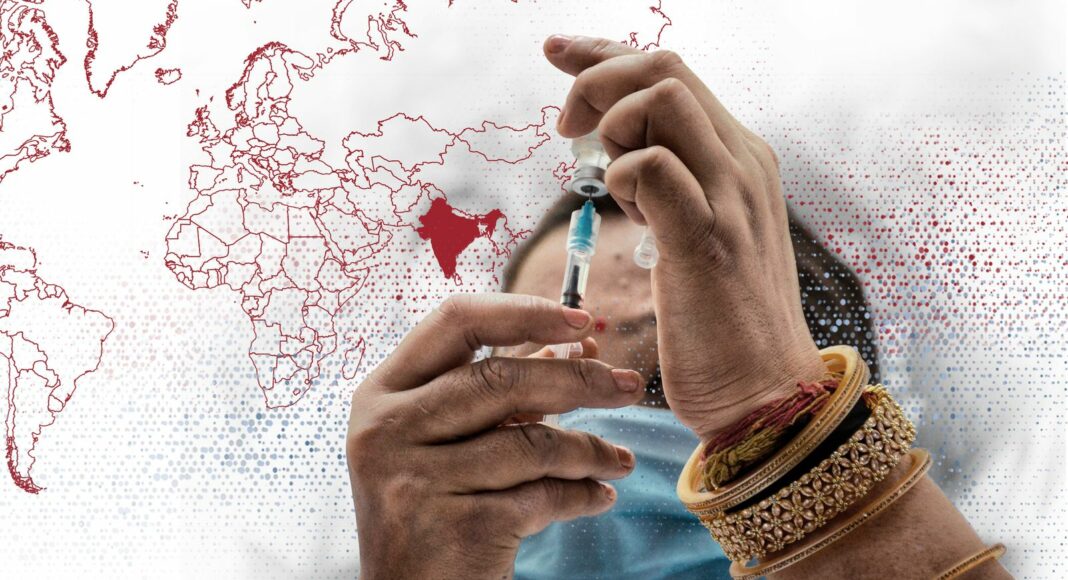One in five doses being jabbed around the world is made in India. The country is also the largest exporter of COVID-19 vaccines to the rest of the world.
Yet, when it comes to inoculating its own people against coronavirus, the South Asian nation has barely covered a tenth of its population, and is now seeing a record number of new deaths every day.
There are fears over whether India’s demand for vaccines to tackle the pandemic might impact other, often lower-income countries in their fights against COVID-19.
Why? About 30% of doses that are exported to other countries are produced in India, Sky News analysis of data from the science analytics company Airfinity shows.
The world depends on four countries which will supply 70% of the total 13.7 billion doses agreed to be manufactured so far: China, India, Germany and the US.
The rest of the doses will be supplied by 16 countries, including the UK. The country is expected to supply 2% of global demand.
But not all countries export vaccines they manufacture while some export more than others.
The UK and Japan are the only countries among the top ones that are not exporting. The doses manufactured in these nations are part of deals with their governments.
Among the top producers, China and the US have deals to export only 18% and 15% of the doses manufactured respectively.
In contrast, India is the biggest exporter of COVID-19 doses, followed by Germany, Russia and some European countries.
But the current crisis in India might have an impact on the supply of vaccines, especially in poor countries.
The Indian government has now temporarily banned exports of vaccine to bring the pandemic under control.
A forecast by Airfinity shows that if India were to maintain its strict ban, the nation would have enough doses to fully vaccinate its entire adult population by November.
But that could lead to supply shortages elsewhere.
Sky News analysis found 35 countries have mostly relied on India for their jabs. About 98% of people receiving these doses are from low or lower-income countries.
Some of these countries have yet to receive a large portion of the doses previously agreed with India – including Bangladesh, Myanmar, Saudi Arabia, Uganda, Zimbabwe and Sri Lanka.
The disruption to supply goes further. India is also slated to produce more than 80% of 2.26 billion doses to COVAX – an alliance of 190 countries which aims to proe access to 92 lower and middle-income economies.
But with three in five people already vaccinated in the UK, there are growing calls from several scientists for vaccines to be more equitably distributed around the world.
“Some degree of vaccine nationalism is justified. Both [the US and the UK] have done a good job so far and fulfilled their moral obligations towards their own,” says Dr Alberto Giubilini from the University of Oxford’s Collective Responsibility for Infectious Disease programme.
He added: “Now they need to continue doing the morally right thing, which from this moment on is to share vaccines.”
Dr Julian Tang, a consultant virologist at the Leicester Royal Infirmary, believes a more equitable distribution of vaccines will help prevent new variants emerging abroad.
He said: “By sending vaccines overseas to stop a virus from replicating elsewhere, you’re not abandoning all care for your own population. Actually, you’re securing the vaccine’s efficacy.”
Countries that have vaccinated a higher proportion of their population have already received a large number of doses. Most of them are wealthy nations.
Many high income countries have been also hardest hit by the pandemic, recording some of the highest number of deaths.
The UK, Chile, the US or Hungary are among the countries that have received a large number of doses while also having recorded some of the highest COVID-19 death rates.
But others like Mexico, Peru and Montenegro with similar death rates have received around a tenth of the doses receivied by UK or the US.
The UK government says it is open to exports in the future.
A government spokesperson said: “The UK will be sharing the majority of any future surplus coronavirus vaccines with the COVAX scheme to support developing countries.”
But the acute scarcity in vaccines has also led to many nations to seek help from Russia and China, according to a new report by the Economist Intelligence Unit.
Vaccines developed by the two nations are priced cheaper than Western jabs to target low and lower income countries but often come with political and economic strings attached.
“Pfizer and Moderna vaccines are essentially unaffordable for most developing countries,” said Agathe Demarais, global forecasting director at the Economist Intelligence Unit. “Without COVAX, their only option is to turn to Russia and China.”




